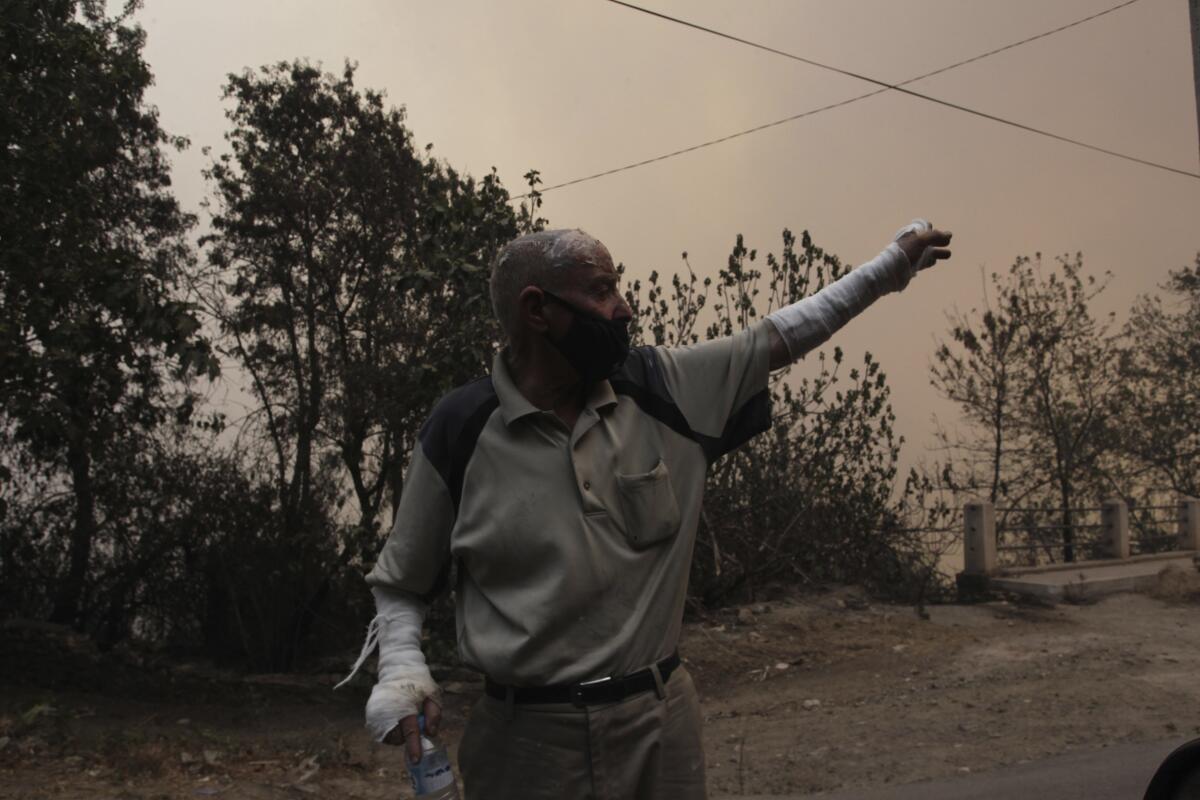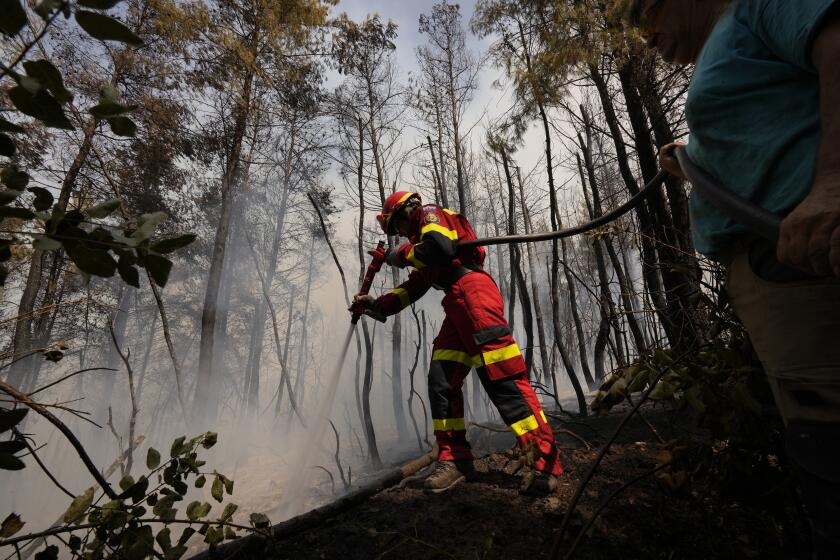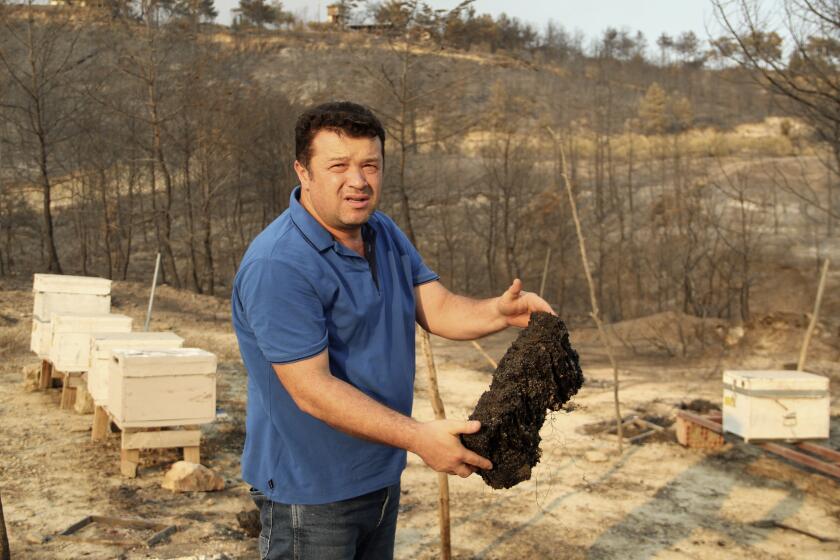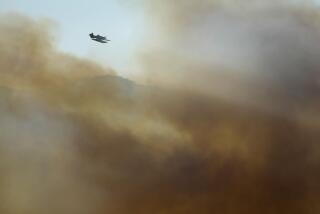Wildfires in Algeria leave 65 dead, including 28 soldiers

- Share via
ALGIERS — At least 28 soldiers have died saving residents from wildfires ravaging mountain forests and villages east of Algeria’s capital, with the overall death toll rising to at least 65, officials said Wednesday.
Algerian President Abdelmadjid Tebboune said the country would enter a three-day period of mourning starting Thursday that would include suspending all government activity except for acts of solidarity. He tweeted Tuesday night that the dead soldiers were “martyrs” who had saved 100 people from blazes in two areas of Kabyle, the region that is home to the North African nation’s Berber population.
The mountainous Kabyle region, 60 miles east of Algiers, is dotted with difficult-to-access villages and, with temperatures rising, has had limited water. Some villagers fled, while others tried to hold back the flames using buckets, branches and rudimentary tools. The region has no water-dumping planes.
The forestry director in Tizi-Ouzou, the regional capital, said Wednesday that 18 fires remained active in the region. Dozens of fires burned elsewhere across the north, but their deadly force was concentrated in Kabyle.
The deaths and injuries Tuesday occurred mainly around Tizi-Ouzou, which is flanked by mountains, and also in Bejaia, which borders the Mediterranean Sea, the president said.
Prime Minister Aimene Benabderrahmane told state television Tuesday that initial reports from security services showed the fires in Kabyle were “highly synchronized,” adding that “leads one to believe these were criminal acts.” Earlier, Interior Minister Kamel Beldjoud traveled to Kabyle to assess the situation and also blamed the fires there on arson.
As Greece’s massive wildfires are being largely tamed, the country’s civil protection chief has strongly defended the country’s firefighting efforts.
“Thirty fires at the same time in the same region can’t be by chance,” Beldjoud said on national television, although no arrests were announced.
There were no immediate details to explain the high death toll among the military. A photo on the site of the Liberte daily showed a soldier with a shovel dousing sputtering flames with dirt, his automatic weapon slung over his shoulder.
Dozens of blazes sprang up Monday in Kabyle and elsewhere, and Algerian authorities sent in the army to help residents battle blazes and evacuate. Multiple fires were burning through forests and devouring olive trees, cattle and chickens that provide the livelihoods of families in the Kabyle region.
North Africa has been sweltering in searing temperatures, including neighboring Tunisia, where scattered fires in the east were reported. Algeria’s National Meteorology Office reported that high temperatures were expected through Thursday in nearly a dozen wilayas, or regions, including around Tizi-Ouzou. In some places, the mercury was forecast to hit 116 degrees.
Turkey’s wildfires have left little behind, turning green forests into ashen hills and threatening the country’s honey industry.
A 92-year-old woman living in the Kabyle mountain village of Ait Saada said the scene Monday night looked like “the end of the world.”
“We were afraid,” Fatima Aoudia told the Associated Press. “The entire hill was transformed into a giant blaze.”
Aoudia compared the fires to bombings by French troops during Algeria’s brutal war of independence, which ended in 1962.
“These burned down forests. It’s a part of me that is gone,” Aoudia said. “It’s a drama for humanity, for nature. It’s a disaster.”
Toward a more sustainable California
Get Boiling Point, our newsletter exploring climate change, energy and the environment, and become part of the conversation — and the solution.
You may occasionally receive promotional content from the Los Angeles Times.
An opposition party with roots in the Kabyle region, the RCD, denounced authorities’ slow response to the blazes as citizens organized local drives to collect bottled water and other supplies.
Calls for help, including from Algerians living abroad, went out on social media, one in English trending on Twitter with the hashtag #PrayforAlgeria. Photos and videos posted showed plumes of dark smoke and orange skies above hillside villages, and soldiers in army fatigues without protective clothing.
Climate scientists say there is little doubt that climate change from the burning of coal, oil and natural gas is driving extreme events, such as heat waves, droughts, wildfires, floods and storms. A worsening drought and heat — both linked to climate change — are driving wildfires in the U.S. West and Russia’s northern region of Siberia.
Extreme heat is also fueling massive fires in Greece and Turkey.
More to Read
Sign up for Essential California
The most important California stories and recommendations in your inbox every morning.
You may occasionally receive promotional content from the Los Angeles Times.










